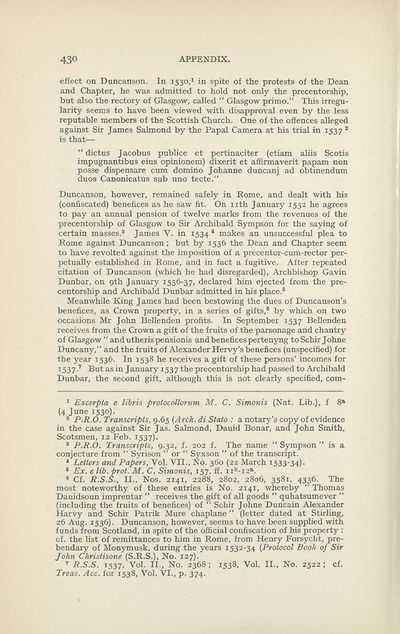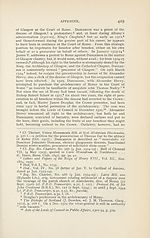Download files
Complete book:
Individual page:
Thumbnail gallery: Grid view | List view

430
APPENDIX.
effect on Duncanson. In 1530,1 in spite of the protests of the Dean
and Chapter, he was admitted to hold not only the precentorship,
but also the rectory of Glasgow, called “ Glasgow primo.” This irregu¬
larity seems to have been viewed with disapproval even by the less
reputable members of the Scottish Church. One of the offences alleged
against Sir James Salmond by the Papal Camera at his trial in 1537 2
is that—
" dictus Jacobus publice et pertinaciter (etiam aliis Scotis
impugnantibus eius opinionem) dixerit et affirmaverit papam non
posse dispensare cum domino Johanne duncanj ad obtinendum
duos Canonicatus sub uno tecte.”
Duncanson, however, remained safely in Rome, and dealt with his
(confiscated) benefices as he saw fit. On nth January 1532 he agrees
to pay an annual pension of twelve marks from the revenues of the
precentorship of Glasgow to Sir Archibald Sympson for the saying of
certain masses.3 James V. in 1534 4 makes an unsuccessful plea to
Rome against Duncanson ; but by 1536 the Dean and Chapter seem
to have revolted against the imposition of a precentor-cum-rector per¬
petually established in Rome, and in fact a fugitive. After repeated
citation of Duncanson (which he had disregarded). Archbishop Gavin
Dunbar, on 9th January 1536-37, declared him ejected from the pre¬
centorship and Archibald Dunbar admitted in his place.5
Meanwhile King J ames had been bestowing the dues of Duncanson’s
benefices, as Crown property, in a series of gifts,6 by which on two
occasions Mr John Bellenden profits. In September 1537 Bellenden
receives from the Crown a gift of the fruits of the parsonage and chantry
of Glasgow “ andutherispensionis and benefices pertenyng toSchir Johne
Duncany,” and the fruits of Alexander Hervy’s benefices (unspecified) for
the year 1536. In 1538 he receives a gift of these persons' incomes for
I537-7 But as in January 1537 the precentorship had passed to Archibald
Dunbar, the second gift, although this is not clearly specified, com-
1 Excerpta e libris protocollorum M. C. Simonis (Nat. Lib.), f 8a
(4 June 1530).
2 P.R.O. Transcripts, 9.65 (Arch, di Stato : a notary’s copy of evidence
in the case against Sir Jas. Salmond, Dauid Bonar, and John Smith,
Scotsmen, 12 Feb. 1537).
3 P.R.O. Transcripts, 9.32, f. 202 f. The name " Sympson ” is a
conjecture from " Syrison " or “ Syxson ” of the transcript.
4 Letters and Papers, Vol. VII., No. 360 (22 March 1533-34).
6 Ex. e lib. prot. M. C. Simonis, 157, ff. nb-i2a.
6 Cf. R.S.S., II., Nos. 2141, 2288, 2802, 2806, 3581, 4336. The
most noteworthy of these entries is No. 2141, whereby “ Thomas
Dauidsoun imprentar ” receives the gift of all goods “ quhatsumever "
(including the fruits of benefices) of “ Schir Johne Duncain Alexander
Harvy and Schir Patrik Mure chaplane ” (letter dated at Stirling,
26 Aug. 1536). Duncanson, however, seems to have been supplied with
funds from Scotland, in spite of the official confiscation of his property :
cf. the list of remittances to him in Rome, from Henry Forsycht, pre¬
bendary of Monymusk, during the years 1532-34 (Protocol Book of Sir
John Christisone (S.R.S.), No. 127).
7 R.S.S. 1537, Vol. II., No. 2368 ; 1538, Vol. II., No. 2522 ; cf.
Treas. Acc. for 1538, Vol. VI., p. 374.
APPENDIX.
effect on Duncanson. In 1530,1 in spite of the protests of the Dean
and Chapter, he was admitted to hold not only the precentorship,
but also the rectory of Glasgow, called “ Glasgow primo.” This irregu¬
larity seems to have been viewed with disapproval even by the less
reputable members of the Scottish Church. One of the offences alleged
against Sir James Salmond by the Papal Camera at his trial in 1537 2
is that—
" dictus Jacobus publice et pertinaciter (etiam aliis Scotis
impugnantibus eius opinionem) dixerit et affirmaverit papam non
posse dispensare cum domino Johanne duncanj ad obtinendum
duos Canonicatus sub uno tecte.”
Duncanson, however, remained safely in Rome, and dealt with his
(confiscated) benefices as he saw fit. On nth January 1532 he agrees
to pay an annual pension of twelve marks from the revenues of the
precentorship of Glasgow to Sir Archibald Sympson for the saying of
certain masses.3 James V. in 1534 4 makes an unsuccessful plea to
Rome against Duncanson ; but by 1536 the Dean and Chapter seem
to have revolted against the imposition of a precentor-cum-rector per¬
petually established in Rome, and in fact a fugitive. After repeated
citation of Duncanson (which he had disregarded). Archbishop Gavin
Dunbar, on 9th January 1536-37, declared him ejected from the pre¬
centorship and Archibald Dunbar admitted in his place.5
Meanwhile King J ames had been bestowing the dues of Duncanson’s
benefices, as Crown property, in a series of gifts,6 by which on two
occasions Mr John Bellenden profits. In September 1537 Bellenden
receives from the Crown a gift of the fruits of the parsonage and chantry
of Glasgow “ andutherispensionis and benefices pertenyng toSchir Johne
Duncany,” and the fruits of Alexander Hervy’s benefices (unspecified) for
the year 1536. In 1538 he receives a gift of these persons' incomes for
I537-7 But as in January 1537 the precentorship had passed to Archibald
Dunbar, the second gift, although this is not clearly specified, com-
1 Excerpta e libris protocollorum M. C. Simonis (Nat. Lib.), f 8a
(4 June 1530).
2 P.R.O. Transcripts, 9.65 (Arch, di Stato : a notary’s copy of evidence
in the case against Sir Jas. Salmond, Dauid Bonar, and John Smith,
Scotsmen, 12 Feb. 1537).
3 P.R.O. Transcripts, 9.32, f. 202 f. The name " Sympson ” is a
conjecture from " Syrison " or “ Syxson ” of the transcript.
4 Letters and Papers, Vol. VII., No. 360 (22 March 1533-34).
6 Ex. e lib. prot. M. C. Simonis, 157, ff. nb-i2a.
6 Cf. R.S.S., II., Nos. 2141, 2288, 2802, 2806, 3581, 4336. The
most noteworthy of these entries is No. 2141, whereby “ Thomas
Dauidsoun imprentar ” receives the gift of all goods “ quhatsumever "
(including the fruits of benefices) of “ Schir Johne Duncain Alexander
Harvy and Schir Patrik Mure chaplane ” (letter dated at Stirling,
26 Aug. 1536). Duncanson, however, seems to have been supplied with
funds from Scotland, in spite of the official confiscation of his property :
cf. the list of remittances to him in Rome, from Henry Forsycht, pre¬
bendary of Monymusk, during the years 1532-34 (Protocol Book of Sir
John Christisone (S.R.S.), No. 127).
7 R.S.S. 1537, Vol. II., No. 2368 ; 1538, Vol. II., No. 2522 ; cf.
Treas. Acc. for 1538, Vol. VI., p. 374.
Set display mode to: Large image | Zoom image | Transcription
Images and transcriptions on this page, including medium image downloads, may be used under the Creative Commons Attribution 4.0 International Licence unless otherwise stated. ![]()
| Publications by Scottish clubs > Scottish Text Society publications > Third series > Chronicles of Scotland > Volume 2, 1941 > (444) |
|---|
| Permanent URL | https://digital.nls.uk/107318452 |
|---|
| Shelfmark | SCS.STES3.15 |
|---|---|
| Attribution and copyright: |
|
| Description | A collection of over 100 Scottish texts dating from around 1400 to 1700. Most titles are in Scots, and include editions of poetry, drama, and prose by major Scottish writers such as John Barbour, William Dunbar, Gavin Douglas, and George Buchanan. Edited by a key scholarly publisher of Scotland's literary history, and published from the late 19th century onwards by the Scottish Text Society. Available here are STS series 1-3. |
|---|

